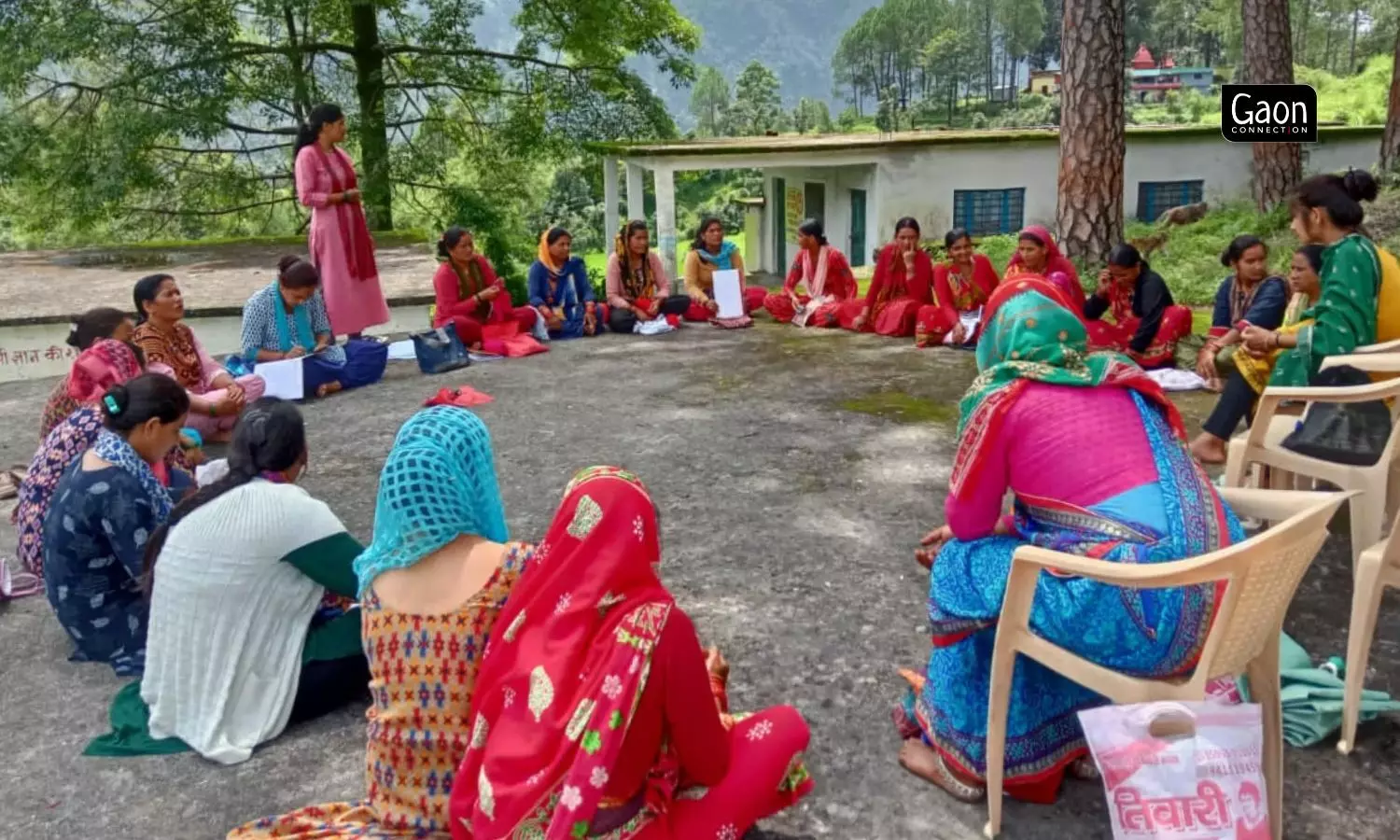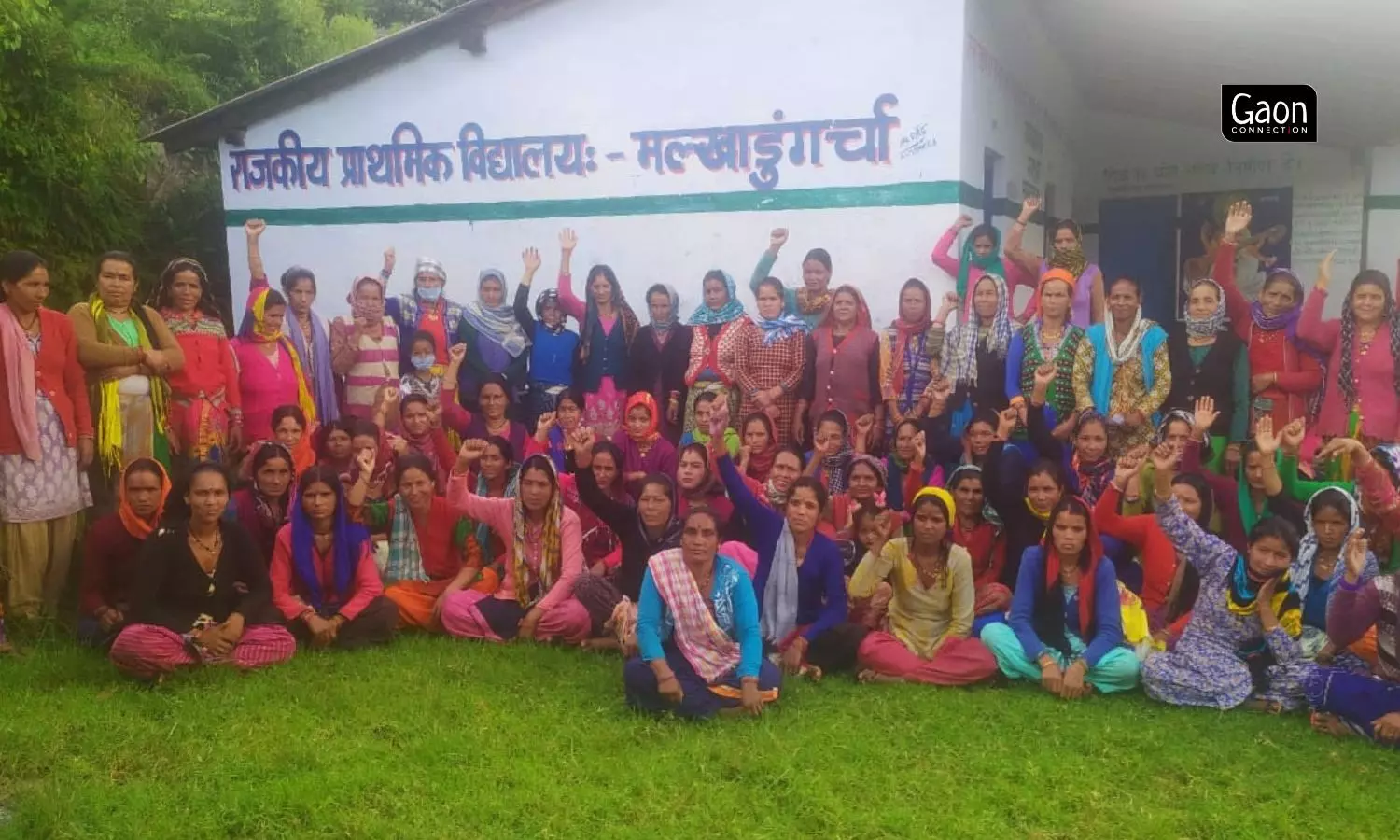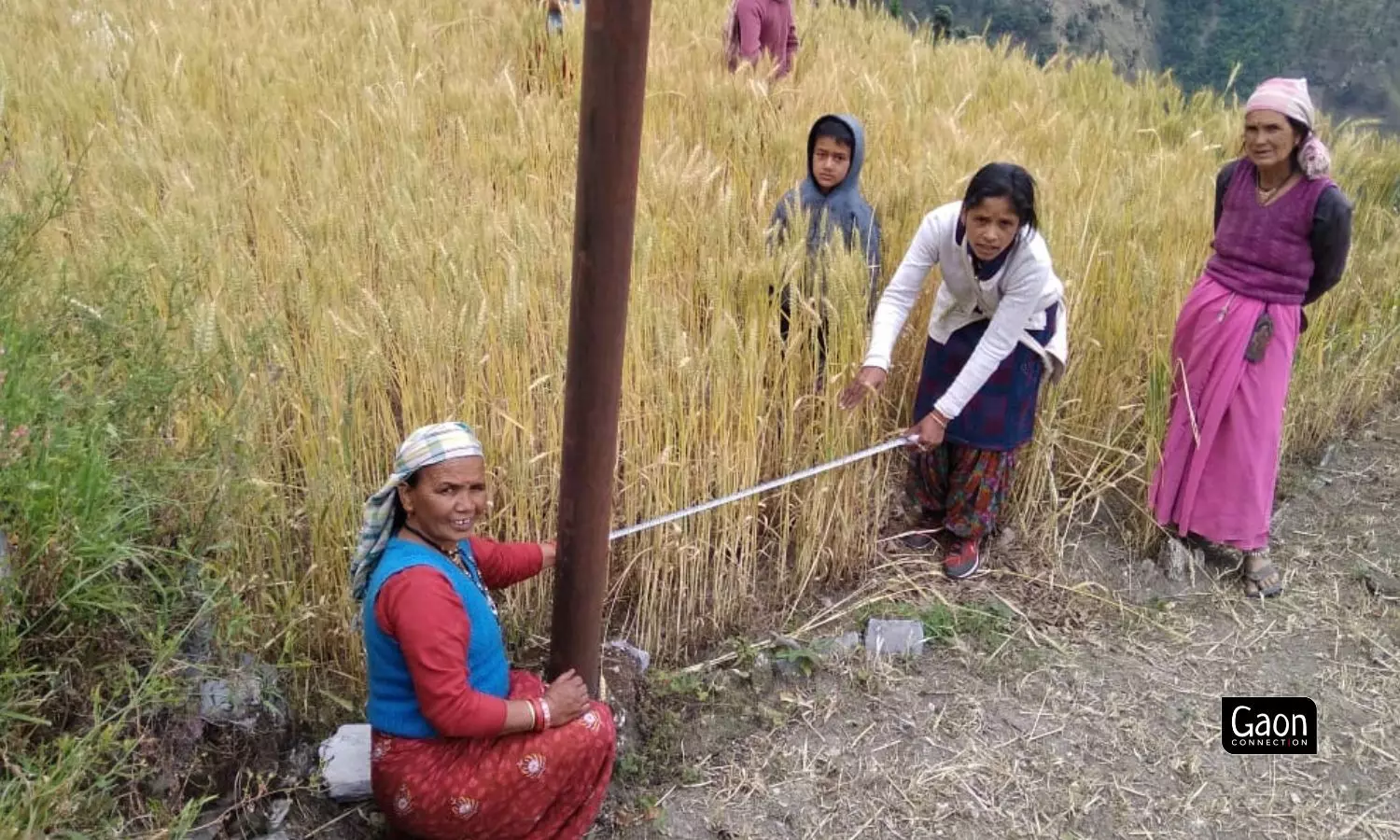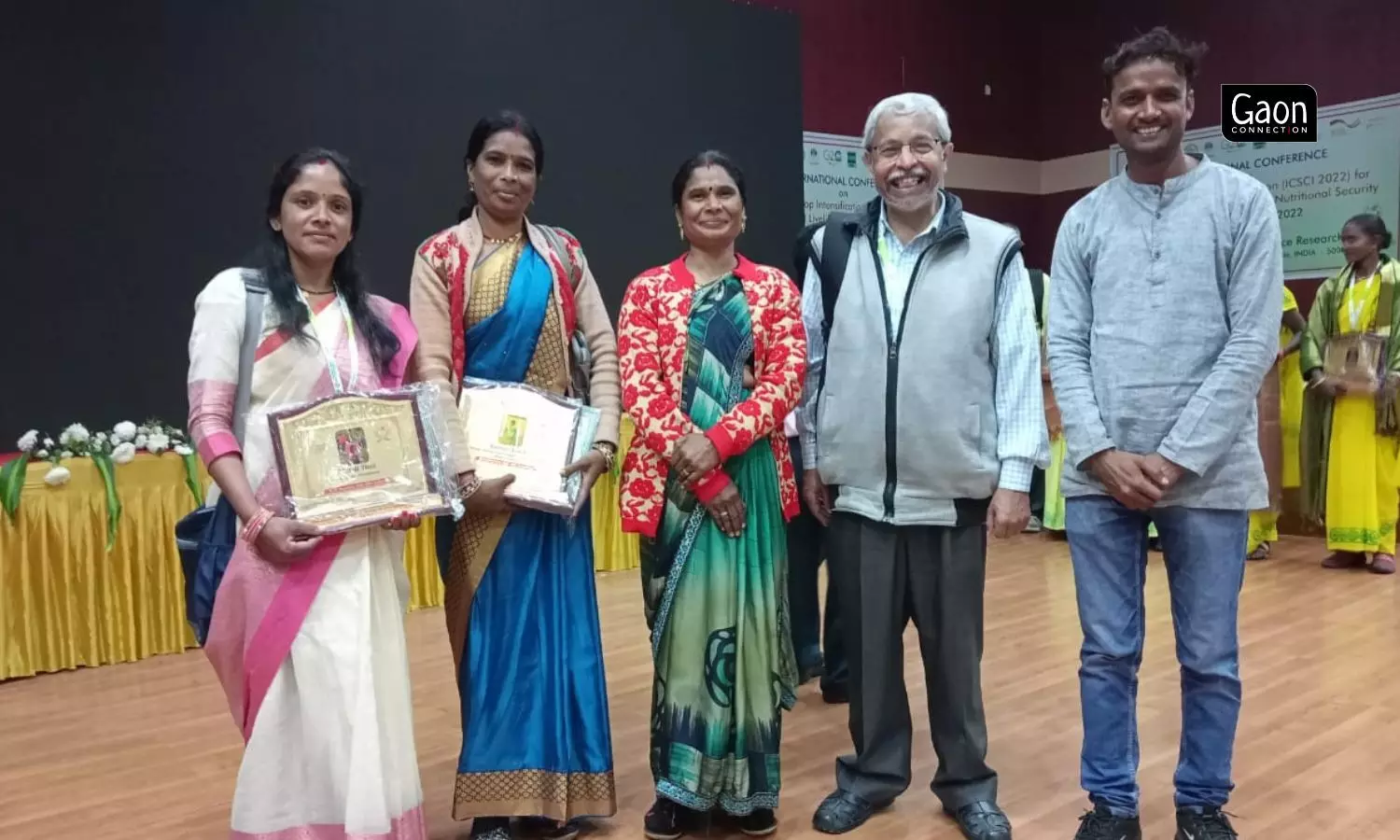Khasti Devi Koranga networks with about 2,500 women farmers from across 15 villages in Bageshwar district, Uttarakhand. These are individual smallholding farmers, members of self-help groups (SHGs) and Mahila Mangal Dals.
Last month, on December 12, Khasti Devi travelled to Hyderabad in Telangana to receive the Best Farmer Award at the International Conference on System of Crop Intensification for Climate-Smart Livelihood and Nutritional Security (ICSCI 2022), held between December 12 and December 14.
This was an acknowledgement of the 35-year-old farmer’s untiring efforts to mobilise other women farmers of the hill state and make them self-reliant.
As part of her work, Khasti demonstrated the System of Crop Intensification technique in her own farm and then shared the technique with other farmers, which has benefitted a large number of women farmers in Kapkot block of Uttarakhand.

As part of her work, Khasti demonstrated the System of Crop Intensification technique in her own farm and then shared the technique with other farmers.
The System of Crop Intensification (SCI) refers to an increase in agricultural production per unit of inputs. The input includes labour, land, time, fertiliser, seed, feed and cash. The aim is to achieve higher output with less use of or less expenditure on land, labour, capital, and water. Crop intensification technique includes intercropping, relay cropping, sequential cropping, ratoon cropping, etc.
Also Read: UP: Unnao’s first women-led SHG for Thai guava cultivation promises better incomes for farmers
“Under Khasti Devi’s watch, farmers adopted SCI in cultivating paddy, wheat, lentil, mandua (Finger millet), makka (Maize) and rajma. As a Master Trainer she trained about 1,200 farmers from 10 villages,” Puran Bartwal of Dehradun-based People’s Science Institute (PSI) told Gaon Connection. PSI is a non-profit organisation, which promotes natural resource management, conservation biology, and sustainable development. Bartwal is working on a farming project in Shama village, where Khasti Devi lives. The village is about 374 kms from the state capital Dehradun.
“SCI has reduced the input cost and enhanced the net income of farmers. It has led to high fodder availability through the year for the livestock,” said Bartwal. “Adopting this process means that farmers need less seeds. There is less weed growth, which makes the crops less susceptible to attack by rodents. And productivity increases up to 70 per cent,” he added.
An air of change
It all began in 2017, when Khasti was trained at the PSI on System of Crop Intensification, watershed management, improved agricultural practices, making of matka manure, and forming self help groups. After her training, Khasti was appointed as the local coordinator of women groups and self-help groups (SHGs) in Kapkot block.
But it was not an easy task, Khasti recalled.
“I remember going from house to house convincing people to try line-sowing methods for a better yield. Older men in the villages mocked me and discouraged women from departing from traditional farming,” she said.

Khasti’s training with PSI enabled her to form SHGs and teach women about book-keeping, inter-loaning, marketing, etc. She also encouraged them into smaller marketing initiatives.
But, undeterred Khasti decided to show and tell and created an experimental patch of half a nali (1 nali= 2,160 square feet) in her family owned land. “Ideally, for that area of land, two kilograms of seeds are required for a traditional way of growing a crop. But, in the line-sowing method just 400 grams are required for the same area,” she explained. .
So Khasti sowed wheat and when it germinated, her patch of land was a carpet of green as compared to the traditionally cultivated land around. “That year, the half-a-nali of land produced 70 kilograms of wheat, almost double of what it would be following traditional methods,” she pointed out.
Also Read: The Strawberry Farmers of Odisha
This was enough motivation for villagers to try more innovative forms of agriculture, the award-winning farmer said.
Khasti persisted with her awareness drives and gradually, the village women came to learn of innovative farming methods subsidies, government schemes in agriculture and loans they could avail of. They also learnt about procurement of seeds, grading and packaging.
Organising village women
Her training with PSI enabled Khasti to form SHGs and help their members run these groups efficiently. She taught women about book-keeping, inter-loaning, marketing, etc. She also encouraged them into smaller marketing initiatives such as selling milk and milk products, vegetables and hand-knitted sweaters, caps and so on. It was a big leap for women Khasti worked with. Many of them had never stepped into a bank or operated a bank account. Not any more.

“Women are no more confined to their homes. They are confident and are helping their husbands earn a livelihood. They are empowered. This confidence has also led to people looking at them with more respect, ” Khasti told Gaon Connection.
Hansi Devi, president of the Mahila Mangal Dal of Jhopda village, told Gaon Connection how Khasti’s intervention had given them a fillip. “We now regularly meet and discuss ways to increase crop yield by practising organic farming. Khasti told members of our Mangal Dal about line sowing methods, and how to procure good seeds,” she said.
Pride in Farming
Ruchika Devi of Farsaliwalli village in Kapkot block of Bageshwar was inspired by what Khasti had accomplished. She too joined a Farmer Producer Organisation and found success.
“The financial condition of the family wasn’t sound. My old parents in-law along with my husband depended on the little agricultural produce they got from the 20 nalis of land we owned. In 2017, I paid a small fee of Rs 500 to become a lifetime member of Krishi Sangam FPO, and began to be trained in agricultural matters,” Ruchika Devi told Gaon Connection.

The System of Crop Intensification (SCI) refers to an increase in agricultural production per unit of inputs.
Today, the 28-year-old grows vegetables on five nali of land, rajma (kidney beans), gahat (horsegram), masoor and safed bhat (white soybean) in four nali. “I also got a 50 per cent subsidy to buy a tractor, and have put up three poly houses for growing English vegetables,” she added.
Ruchika’s family is enjoying a great impact from all the changes she brought about in her cultivation practices. They have constructed a pucca house, and she said her income from farming is close to Rs 1.5 lakhs per annum. Earlier, she just earned about Rs 30,000 a year, she said.
“I have opened savings bank accounts for my family and I feel empowered, more confident, and more respected by society,” Ruchika said with pride.
Also Read: Nursery time in Ramgarh, Jharkhand
Early life of Khasti Devi
Khasti’s life was not very different from thousands of other hill women who work tirelessly and rarely receive the respect they deserve. She lived in Guler Kharku, a remote village. “My village was 57 kilometres from the district headquarters at Bageshwar and I had no exposure to the outside world. I used to daily walk six to seven kilometres on an average one way to reach my school”, Khasti told Gaon Connection.

After school hours, she helped her mother in the fields tilling, preparing the field for sowing, putting manure, collecting seeds and sowing, all using traditional farming methods. “The produce was just enough for the family, and not for a livelihood,” Khasti recalled. It was a tough life for a farmer.
All too soon, at the age of 18, after she completed her 12th standard, she was married off in 2007, and she moved to Shama, 50 kilometres away from her native village. “Shama village was also not as developed as it is today,” Khasti said.
“When my daughter-in-law expressed her desire to do farming, I was sceptical. Farming is not rewarding, I didn’t want her to become an unpaid agricultural labour in her own field,” Lakshmi Devi, the mother-in-law of Khasti, told Gaon Connection. She wanted her daughter-in-law to either study further or teach.

In 2011,Khasti joined the Vishva Hindu Parishad as a coordinator to 80 schools, and was paid Rs 2,000 per month. A year later, in 2012, she did a Bachelors in Hindi and Sanskrit, and followed that up with a double Masters, to help her get a teaching job. “I had to withdraw from my B.Ed course because I gave birth to my daughter,” Khasti said.
But farming was what called out to her and she did some pioneering work in that field that won her the recognition. “I can’t be prouder of her for having won that international award,” her mother-in-law said.
Khasti’s work in Shama has paved the way for many initiatives. Farmers there are getting good returns for their produce.
There are several government agencies (like NABARD) and non-government ones (like PSI) that are invested in the Shama cluster. And they are all sowing the seeds of change that will positively impact the area and its farmers, Khasti hoped.


















